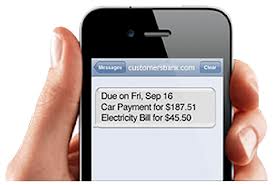
In case of a security breach
People worry about identity theft, particularly the biggest kind where your entire identity is hijacked and all of your accounts are compromised. But it’s far more common that a thief gains access to a single account. Though it is possible for them to acquire access to all other financial accounts, the theft of the original account is often discovered before the thief can access the others.
A checking account is particularly vulnerable to identity theft because checks include not only your personal information, such as your name and address, but also the bank routing number, and most important, your personal account number. Both numbers are imprinted at the bottom of your checks. By issuing checks to pay bills, you’re putting this sensitive information out to other people, some of whom may be thieves.
It’s worth noting that identity theft is usually an inside job, which is to say that an employee of any company that you do business with could gain access to your account information if you pay by check. It’s not always possible to avoid paying your bills by check, so you have to be aware of the possibility that account information can be stolen. It’s a reality that we all live with.
But if your account information is hijacked by a thief on one checking account, you can continue to transact business with your second account. This will minimize the disruption caused by the theft. Just be sure that the second account is held at a different bank than the first one, so that it will not be so easy for the thief to get access to both accounts.
To allocate expenses
We often hear of people budgeting using envelopes – either virtual as part of an application, or even literal envelopes. Having two checking accounts can help you to do this without having to resort to buying and implementing an application, or maintaining physical envelopes.
For example, you can use one checking account to pay minor expenses, such as grocery bills and ATM charges. You can use the second account to cover larger expenses, such as your mortgage payment, health insurance or car payments. This will help you have the money available to make the larger payments, without running the risk that the swipe of an ATM card could leave you short funds.
To maintain a budget
This is similar to the concept above, except that it gets more specific. For example, you can use one checking account to pay for fixed expenses, like your house payment, debt payments, and insurance premiums. The second can be used to pay for variable expenses, such as groceries, entertainment, gasoline, and impulse purchases.
Once again, the separation will create a wall between your expense categories, and will keep you from over spending in either category. By limiting your variable expenses to a single checking account, you can limit the amount of money that you might have available for impulse purchases, such as clothing and entertainment.
To save money for large expected expenses
You should always have a checking account to pay for your expenses, and an emergency fund to be available for true emergencies. But there are what you might call halfway expenses – outlays that are large enough to be worthy of an emergency fund withdrawal, but don’t rise to the level of an actual emergency.
Car repairs are just such an example. Though you can’t know when they will strike, or how much they will cost, you know that they’re coming at some point. That means that while the cost will be disruptive, it won’t be entirely unpredictable. You can use a second checking account as a place to accumulate money to handle such expenses, that will help you to avoid dipping into your emergency fund.
Other uses could include using the second checking account to accumulate money for an upcoming holiday season or vacation. You may even use it if you know you’re going to have a major repair, such as replacing your roof or HVAC. Once again, these are large and disruptive expenses, but they’re not emergencies because you know they’re coming.
To have a second account to tap instead of using a credit line
Many people fall into the pattern of tapping their credit lines whenever their checking account is empty. But if you have a second checking account, always stocked with at least some money, you can access the funds in that account, rather than using a credit card or withdrawing money from your emergency fund.
The idea is to create levels of liquid cash that you have available so that you will not take on debt or withdraw money from accounts that have other purposes. This can work especially well for married couples where each spouse has their own checking account. If one spouse is running low in their checking account, they can get funds from the other spouse’s account.
If the fees charged on your checking accounts are reasonable, look into maintaining two checking accounts. Sometimes maintaining a smooth cash flow is worth paying the extra cost of the second account.













